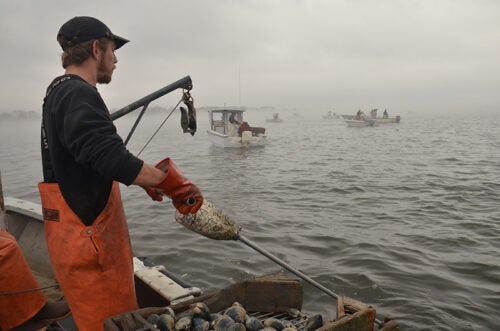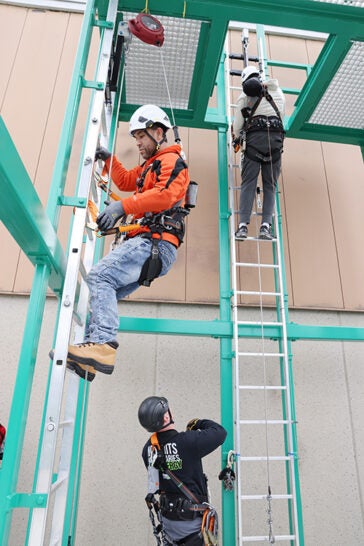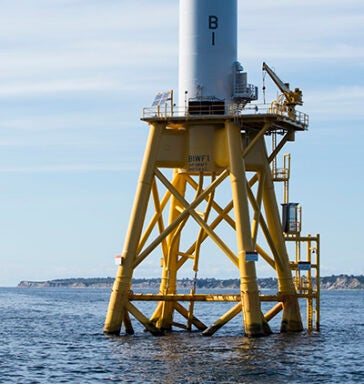By Ellen Liberman
Rennie Meyers knew she wanted to work in an ocean-related field since she was a teenager in the Bronx, volunteering as a docent at the New York Aquarium on Coney Island. Her career path included stints as a master diver in Puget Sound and at the National Science Foundation’s Division of Ocean Science, earning a master’s degree in marine affairs, studying artificial reefs as a Watson Fellow, and in Washington D.C., navigating congressional appropriations and policy as a Knauss Public Policy Fellow. Today, she’s based in Denmark, helping the world’s largest offshore wind developer, Ørsted, shape the global policy portfolio for ocean health and biodiversity.
“I was eager to help find solutions to hard problems in an industry that is going to help us address the climate crisis and hopefully address the ocean biodiversity crisis in the process,” she says. “The great thing about working in the blue economy is there’s so many different ways you can contribute to sustainable oceans, and so many different types of work to do.”

Natalie Lynch wanted to be a police officer, but a couple of months into a criminal justice program at the Community College of Rhode Island (CCRI) was enough to persuade her that college was not right for her. Less than a year later, the 19-year-old from Narragansett was back at CCRI to take a five-week maritime sheet metal training course at the Westerly Education Center. In collaboration with Electric Boat (EB), the program prepares students for the basics of naval ship building—how to interpret construction drawings, and how to layout, fabricate, assemble and install light-gauge metalwork. Now she’s bending metal and working with welders at EB’s Quonset facility. Lynch is jazzed about the pay, the retirement benefits and the job itself.
“I knew nothing when I first went, but the training taught me a lot,” she says. “It’s a lot of teamwork and I love it.”
Potential for Prosperity
In 2023, the Grow Blue Partnership, a state coalition of industry and environmental groups, government agencies and academic institutions, including the University of Rhode Island (URI), defined the blue economy as “the sustainable use of the ocean to create a resilient economy and good paying jobs.” And, it is worth billions. The United Nations estimates the value of the ocean global economy at $2.5 trillion dollars annually.
In Rhode Island, that figure is $5 billion, and growing. The Partnership forecasted it will double in 10 years and, by 2034, the blue economy in R.I. will create 54,000 new jobs in industries such as ports and shipping, tourism and recreation, offshore renewable energy, the marine trades, aquaculture and fisheries and defense. About 36,500 Rhode Islanders already work in this sector, and their impact on the state is proportionally larger than the numbers suggest, says Jennifer McCann, director of U.S. coastal programs at GSO’s Coastal Resources Center, and author of the 2020 report “The Value of Rhode Island’s Blue Economy.” Unlike other coastal states, it is not measured in multiple billions or trillions of dollars, she says, but a significant percentage of Rhode Islanders work in the blue economy, some six to nine percent compared to three percent elsewhere.
“We have a stronger connection to our blue economy. The value is not just economic. It’s much more comprehensive—it includes advocacy, governance, protection and research,” she says. “And in Rhode Island, we need to capitalize on our three degrees of separation—that’s a strength because we know each other. We’re very innovative and creative, and I think we need to build upon that, too.”
The great thing about working in the blue economy is there’s so many different ways you can contribute to sustainable oceans, and so many different types of work to do.—Rennie Meyers
Filling the ranks of the future ocean workforce is now a statewide project among industry, government and academia, with GSO playing a meaningful role.
“Pure discovery-driven science in the exploration of our unknowns on this planet—ecologically, scientifically, technologically—is absolutely critical to a healthy economy globally,” says GSO Dean Paula Bontempi. “The blue economy is a fairly new phrase in economic sectors, but it’s existed forever. We would not know anything about how to manage those resources sustainably if we did not have the infrastructure to actually make those observations in the ocean. And that discovery-driven science needs to be translated into management and policy using relevant and ready science. That’s one thing people on URI’s Bay Campus have been doing extensively for over five decades—taking all that discovery-driven science and making it relevant, digestible and implementable to managers and policy makers, not just statewide, but worldwide.”
Rhode Island Sea Grant, for example, supports seven internship and fellowship programs in coastal management, and in ocean research, law, communications, community engagement and public policy. In the latest reporting year, February 2022 through January 2023, these programs supported 25 undergraduate students in research, extension, or communications internships and another 65 graduate students and Knauss public policy fellows. According to Sea Grant’s outcomes data, within that period, they enabled 24 graduate students to get well-paid ocean professional positions—Meyers is one.

“There’s a lot of effort to train people across the different levels and interests and the kind of time frames that people are looking at,” says Tracey Dalton, professor of marine affairs and director of Rhode Island Sea Grant. “There’s also been a lot of effort to build connections between the blue economy and climate resilience and jobs that have been historically around and related to these issues—like landscapers or real estate agents or people in construction—and figure out how to better train people for these jobs.”
On-Point Education
For the last several years, GSO has been expanding its offerings to address this need. In June 2023, it graduated the first 12-student cohort of the virtual Masters of Oceanography degree program, geared toward applicants with a STEM background. Most of the students were working professionals employed in ocean-related jobs. Professor of oceanography Arthur Spivack, who led the program’s development, says they performed well in the online space.
“My initial skepticism changed to enthusiasm as a result of seeing how the students valued the program and how it’s helped them,” he says. “We traditionally have worked in person, so I didn’t know how good students would be until I actually started working with them and saw how effectively they learned the material.”
More recently, GSO launched a 12-credit Ocean Science Graduate Certificate for students, which can be paired with the Master of Public Administration program, who want to focus on ocean policy. GSO is in discussions with URI College of Business to have the Ocean Science Certificate accepted in the Master of Business Administration program.
“Based on people who’ve inquired about our programs, there’s a lot of people who need to know about modern ocean science results, but who are not scientists,” says Spivack.
GSO will further boost its efforts to boost blue economy workforce development should it win a $1.85 million grant. A proposal for a three-year program has been made in response to a NOAA grant competition funded by the 2023 Inflation Reduction Act. The Climate Ready Workforce for Coastal States, Tribes, and Territories Competition expects to award 10 to 20 projects with federal funds of $500,000 up to $10 million. Each project must support partnerships that develop workforce training programs for the skills most in-demand in that regional economy and offer wrap-around services to participants to ensure their training and employment success.
GSO’s grant application, Developing Multiple Pathways of Workforce Development for Climate Resilience in Rhode Island and Coastal New England, would work with CCRI and the state Department of Labor and Training (DLT) to develop and deliver a climate-resilience curriculum that addresses state workforce needs in healthcare, insurance, maritime, and ocean research sectors. Led at GSO by associate dean of academic affairs Robert Pockalny, assistant dean of justice, equity, diversity, and inclusion (JEDI) initiatives Princess Metuge, and Spivack, the program would create new climate resilience credentials, certificates and degrees at CCRI and URI. It includes lectures for healthcare professionals, on-line and in-person week-long modules for insurance professionals, hands-on experiences for maritime crews, and full courses for an evolving degree track for oceanographic instrumentation technicians.
It is a constant focus—giving our students the opportunities that other students across Rhode Island have always had at their fingertips.— Vice President Jennie Johnson, Workforce Partnerships, CCRI
For CCRI, this program would be a natural fit. The two-year college already works with Rhode Island Commerce, the Rhode Island Building Trades Council, Rhode Island Building Futures, the DLT and area employers to deliver training programs for prospective workers in a way that accommodates their students’ need for transportation, and work, family and financial obligations, says Jennie Johnson, CCRI’s vice president for the Division of Workforce Partnerships.

“It’s always top of mind,” she says. “For example, we were just re-designated a hispanic serving institution. So, it is a constant focus—giving our students the opportunities that other students across Rhode Island have always had at their fingertips and creating a workforce that is reflective of the diversity of our state.”
DLT will assist with job placement and collaborate with community-based organizations to provide case management services for necessities such as housing, nutrition, and transportation.
The bulk of the grant would go to CCRI, an important partner in putting together the proposal and in designing the curriculum, says Pockalny.
Pockalny says he learned the importance of a holistic student-centered approach during the Authentic Cruise Research Experience for Underrepresented Students Program. Funded by the National Science Foundation, it gives undergraduate students from CCRI, UMass Boston, and Puerto Rico a spot on a research cruise. But meshing research cruise schedules with the life circumstances of CCRI students proved difficult.
“It was tough. There was a lag and the students had either graduated or their lives changed. We had one student who had to drop out of the program, because even though we compensated the students for their time during the workshop and cruise, she had multiple jobs, and couldn’t leave her family,” he says. “We didn’t really know the life experiences of a lot of these students. It was eye-opening about the limitations.”
“[CCRI] really jumped at this opportunity and homed in on what’s possible, because they understand those students and the resources they need to evolve and how to create those pathways for better lives, jobs and careers.”
The Rising Tide That’s Lifting All Boats
“Now the focus is partly around drawing other people into the GSO space to augment themselves professionally or bring in people who may not have intersected, or thought they would ever intersect, with GSO by looking downstream to people getting associate degrees and people already in the workforce,” Bontempi says.
There’s a wide swath of Rhode Island workers who could benefit, says Matthew Touchette of Commerce Rhode Island.
“One of the most compelling things about the blue economy is that only about half of the jobs require a full four-year degree. This has immense potential for increasing wage equity, median household incomes and Rhode Island’s GDP overall. We anticipate needing many jobs in the offshore wind and ocean renewable energy fields—offshore wind is set to move from less than 1,000 jobs total in the nation in 2022 to between 15,000 and 58,000 more jobs annually, according to the Department of Energy’s National Renewable Energy Laboratory. And we anticipate big growth in undersea ocean technologies,” he says. “More importantly, a lot of these jobs aren’t prevalent in our economy today. This means our youth as well as those workers looking to reskill aren’t easily exposed to potential opportunities in the blue economy.”
“It’s important that we build out this growth sector. We are the Ocean State, and there are numerous scalable commercial opportunities. So, it’s front and center in our thinking: how to get the greatest return on our investments with limited resources,” says John Willumsen, a senior advisor to DLT’s director, Matt Weldon.

“We know these are going to be highly technical jobs,” says Alyssa Alvarado, executive director of the Governor’s Workforce Board. “And we want to ensure they are available to Rhode Islanders. We don’t want to have to bring in labor from other places to perform this work, whether it’s a crew from a southern state or from Europe, and they work for six months. Yes, they put some funding into the economy, but then they’re gone, and Rhode Islanders who could have had that career are left out.”
More people are interested in what else they can do with their science besides just the science. They are asking: ‘How can I make change?’—Emily Patrolia, ’G16
Ensuring that this future workforce is diverse will be key to its success, says Metuge. Currently, GSO has a diverse ocean science student population of 14%—a seven-fold increase over its historical 2%, and twice the national geosciences average of 7%. But Metuge sees room for improvement in how students are recruited and given research lab opportunities.
“Often, when people hear about diversity, equity and inclusion, they equate it to providing access to people of color, which is only a minute part of it. DEI is important, because it allows people to understand that everyone, regardless of who they are, where they come from, has something to bring to the table,” she says. “Traditionally, in academia you don’t see a lot of racial diversity, but if you’re going to be part of an effort to create a future workforce that embraces that concept, what do you have to do to achieve that? You cannot diversify GSO by doing what you’ve been doing for 60 years. We have to be able to understand how important and beneficial it is to everyone.”
In the meantime, the most recent entrants into the blue economy workforce see expansive career horizons and ways URI can help move them forward.
In 2020, former Knauss fellow Emily Patrolia, ’G16, opened her own ocean lobbying shop, ESP Advisors, to support her federal, NGO and commercial clients in their efforts to write regulations or win federal support. She says that URI’s evolution towards creating flexible tailored programs with practical applications aligns with what she hears from graduate students.
“I participate in a number of career panels, and even though I did not graduate all that long ago, I am seeing some shifts,” she says. “More people are askin what else they can do with their science besides just the science. They are asking: ‘How can I make change?’ Having the options to learn about the different levers that they could pull as scientists could be really appealing.”
Ryan Doherty, 19, is an entry-level electrical worker at EB, and a graduate of a CCRI-EB training program. For now, he’s laying cables, but he’s also looking ahead to becoming an apprentice, earning an associate’s degree at CCRI—and maybe a bachelor’s in electrical engineering at URI.
“Some people call this a job. I think of it as a career, somewhere I’d like to develop,” he says. “The blue economy right now is a booming industry with a lot of positions and ways to work up. I think it’s a great place for younger people who are looking to get into change.”
